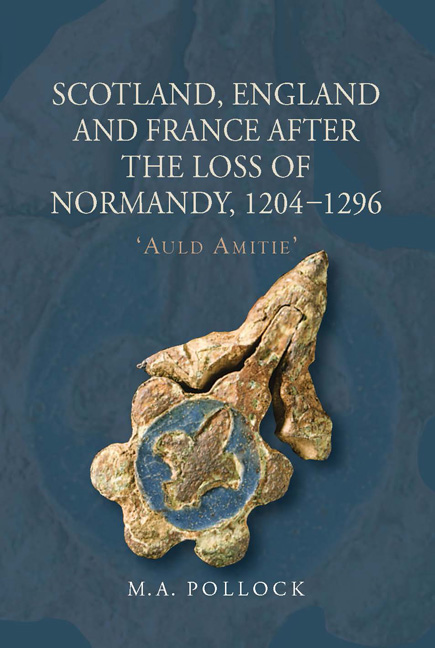Book contents
- Frontmatter
- Dedication
- Contents
- List of Genealogical Tables
- Acknowledgements
- List of Abbreviations
- Introduction
- 1 King John and Scotland after the Loss of Normandy
- 2 The Scots and the First Barons' War
- 3 Alexander and Henry III
- 4 War and Marriage: The French Dimension
- 5 The ‘Auld Alliance’: A New Beginning
- Conclusion
- Bibliography
- Index
5 - The ‘Auld Alliance’: A New Beginning
Published online by Cambridge University Press: 05 May 2015
- Frontmatter
- Dedication
- Contents
- List of Genealogical Tables
- Acknowledgements
- List of Abbreviations
- Introduction
- 1 King John and Scotland after the Loss of Normandy
- 2 The Scots and the First Barons' War
- 3 Alexander and Henry III
- 4 War and Marriage: The French Dimension
- 5 The ‘Auld Alliance’: A New Beginning
- Conclusion
- Bibliography
- Index
Summary
Anglo-Scottish Amity: the Minority Period
The French alliance was to make a brief resurgence within a few years of Joan Plantagenet's death and then nearly burn out over the following fifty years. The decline of the French alliance was caused by several factors. The primary factor was the demise since 1204 of families who held lands in England, Scotland and France. Most Scottish families and their English cousins no longer held property in France and rarely forged marriage alliances across the Channel by the mid-thirteenth century. A second influence for the weakening of Franco-Scottish amity was the period of about forty years of good relations between the English and Scottish crowns following the death of Alexander II. As long as either the French or Scots were content with English diplomacy then the need for the Franco-Scottish alliance lessened, which was certainly the case after 1244.
Both kings had more pressing concerns, some of which were better resolved in collaboration. An increasing number of disputes and raids in the Borders was causing trouble and it was decided, after a few meetings, that laws and customs in the Marches should be handled separately. These laws were decided and laid out in 1249, which eased some of the remaining tension between the realms, but there was still some concern over the issue of overlordship.
Alexander II had pushed for the ecclesiastical independence of Scotland throughout his reign but had failed. At the peak of the hostilities between England and Scotland in 1233, he had applied to the papacy to be anointed and crowned but the motion had been blocked by Henry III and the arch- bishop of York. There was a push once again after his death to have his son and successor, Alexander III, anointed and crowned as a symbol of Scottish independence.
- Type
- Chapter
- Information
- Scotland, England and France after the Loss of Normandy, 1204–1296'Auld Amitie', pp. 162 - 217Publisher: Boydell & BrewerPrint publication year: 2015



